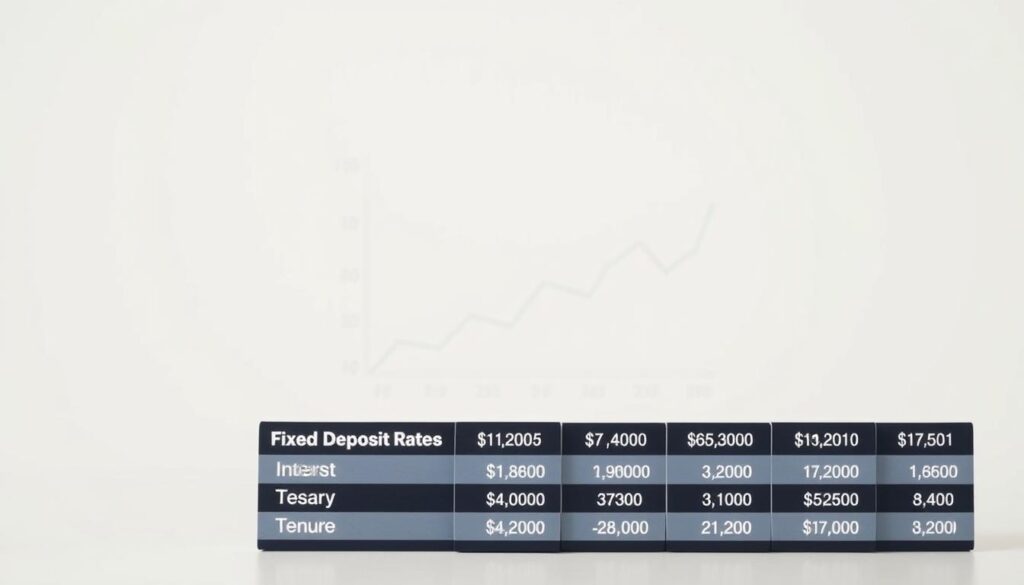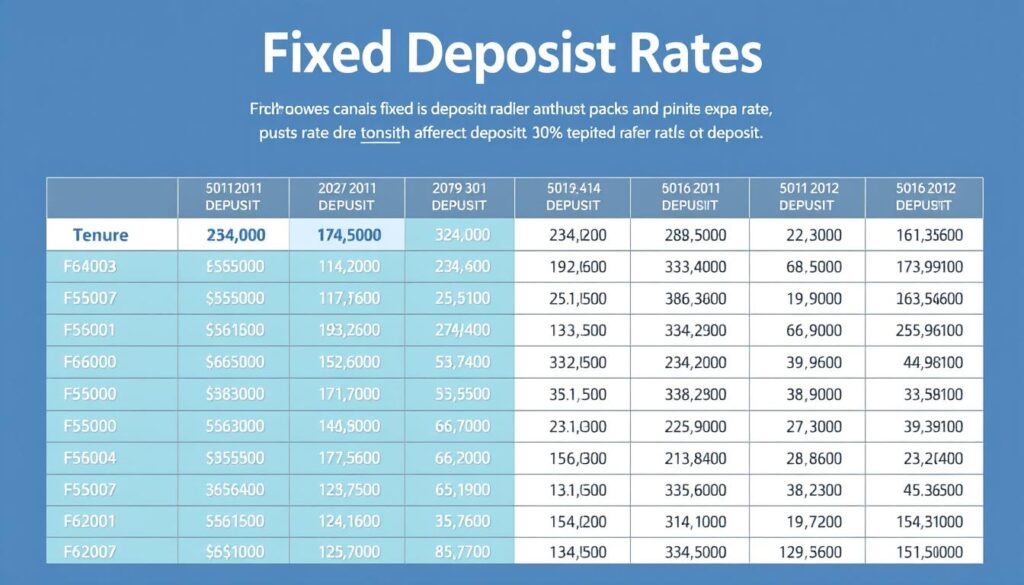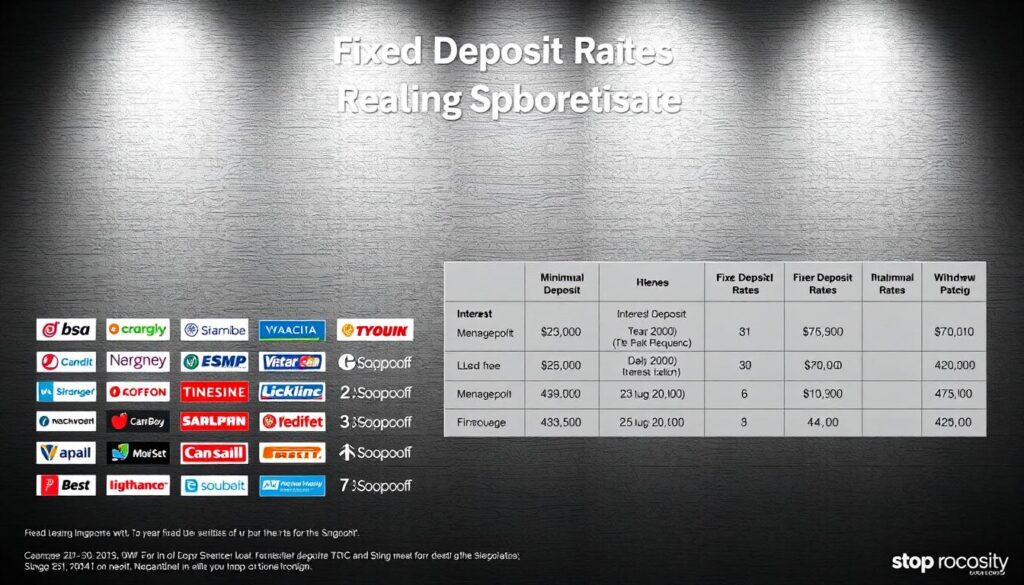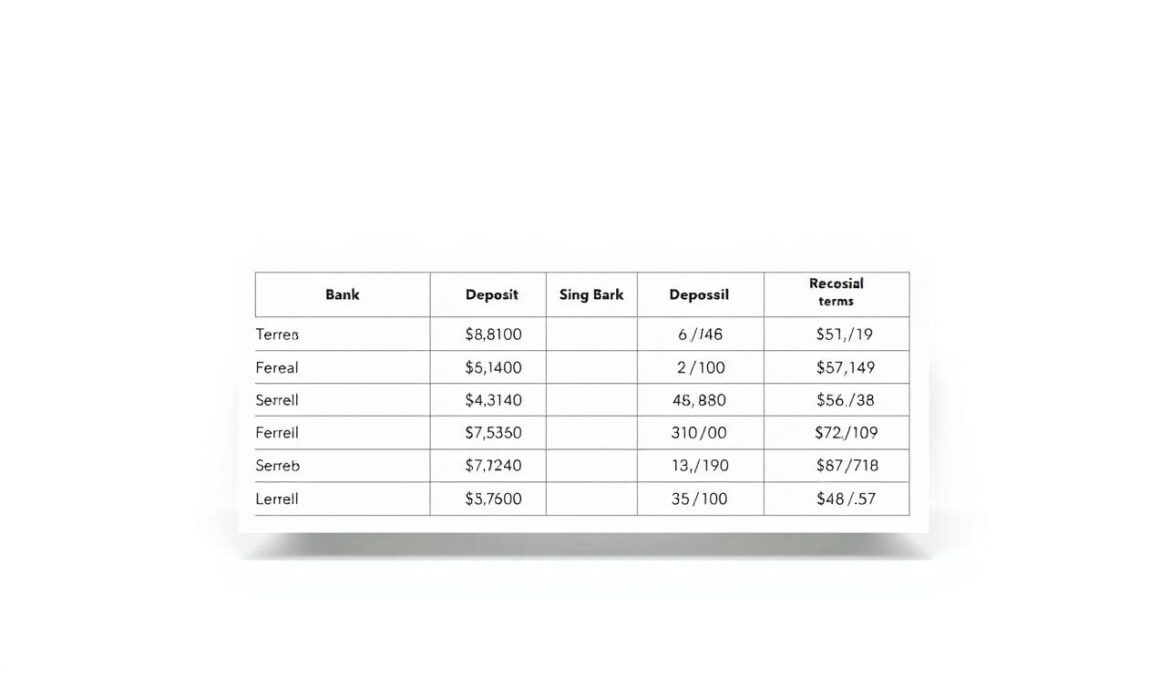Looking for ways to make your money work harder? Many banking customers in Singapore are noticing a change in the financial landscape. Interest rates on savings products have been trending downward in recent months.
This makes it more important than ever to compare your options. Finding the right account can help you secure higher returns on your hard-earned cash. Some institutions still offer attractive promotional rates for those willing to lock in their funds.
This guide will walk you through the current offers from top banks. We’ll highlight key details like tenure options and minimum deposit requirements. Our goal is to help you make a smart choice with your personal banking needs.
Key Takeaways
- Interest levels on savings products have decreased across most banks.
- Comparing different offers is crucial for maximizing your returns.
- Some banks provide promotional rates that are higher than standard ones.
- Tenure length and deposit amount can significantly affect your earnings.
- Always check if fresh funds are required to qualify for special offers.
- Use online tools and internet banking for easy rate comparisons.
- Your money is protected under Singapore’s deposit insurance scheme.
Introduction to Fixed Deposits in Singapore
Want to grow your savings without market risks? A time deposit account might be your perfect solution. These accounts offer guaranteed returns when you commit your funds for a specific period.
You lock in your money for a set duration. In return, the bank provides a predetermined return. This makes them one of the most straightforward investment options available.
Most financial institutions require a certain amount to open an account. This can range from as low as S$500 to S$20,000 or more. Always check the specific requirements before committing.
Key features include:
- Predictable earnings with no surprise fluctuations
- Various tenure options from months to years
- Protection under Singapore’s deposit insurance scheme
- Potential penalties for early withdrawal
Your funds receive coverage up to S$100,000 through the SDIC. This government protection adds an extra layer of security for your investment.
Current economic conditions make these accounts particularly relevant. While returns may vary, they remain a popular choice for conservative investors. Many banking customers appreciate their simplicity and reliability.
Some institutions offer special promotional rates for new funds. These can provide additional earning potential beyond standard offers. Always compare current opportunities across different banks.
Using online tools makes comparison shopping easy. Internet banking platforms allow quick access to current offers. You can review terms and conditions without visiting branches.
Whether you’re saving for short-term goals or long-term security, these accounts offer peace of mind. Your money grows safely while you focus on other priorities.
Why Compare Fixed Deposit Rates?
Are you getting the most from your savings? In today’s financial climate, small differences in returns add up quickly. Comparing options helps you maximize your money’s potential.

Banks offer varying promotional deals that change often. A slight percentage difference might seem small. But it significantly impacts your total earnings over time.
Smart investors know that every fraction of a percent counts when growing savings.
Consider this example with a S$10,000 placement:
- 1.40% rate gives S$140 yearly interest
- 1.60% rate gives S$160 yearly interest
- That S$20 difference grows with larger amounts
Multiple factors influence your final returns:
- Placement duration affects your percentage
- Required minimum amounts vary by institution
- Special promotions often need fresh transfers
- Digital banking makes comparing offers easier
Regularly checking current opportunities ensures you never miss better deals. Financial institutions frequently update their special offers. Staying informed becomes a valuable money management habit.
Your personal banking strategy should include periodic rate comparisons. This simple practice helps secure higher returns on your hard-earned savings.
Best Fixed Deposit Rates by Tenure
Different time frames can work better for various saving goals. Some people prefer shorter commitments while others want longer terms. The right choice depends on your personal banking needs.
Financial institutions provide various options to match different preferences. You’ll find opportunities from three months up to one year. Each duration comes with its own potential returns.

Three-Month Options
Short-term placements offer flexibility for your money. Two institutions currently lead with attractive returns. Both provide 1.40% for this brief period.
RHB requires S$20,000 to access their offer. Bank China asks for just S$500 to begin. This makes their deal accessible to more banking customers.
Six-Month Opportunities
Half-year commitments balance flexibility with slightly higher returns. DBS/POSB currently offers 1.40% for six months. Their minimum deposit amount is only S$1,000.
This low entry point makes it easy to start growing your savings. Many people find this duration perfect for medium-term goals.
Nine-Month Plans
Longer periods often bring better returns on your money. DBS/POSB leads here with a strong 1.60% rate. They maintain the same low S$1,000 requirement.
This represents a nice jump from shorter options. The extra three months can significantly boost your total earnings.
Twelve-Month Choices
Full-year commitments typically offer the highest potential returns. DBS/POSB again leads with their 1.60% promotional rate. They keep the same accessible S$1,000 minimum.
This consistency across longer terms makes comparison easier. You get higher interest without increasing your initial investment.
Always remember that these are promotional rates subject to change. Financial institutions frequently update their special offers.
You should verify current terms before making any decisions. Use internet banking tools to check the latest information. This ensures you always get the most current deals available.
Your money deserves the best possible growth opportunity. Taking a few minutes to compare can make a real difference in your returns.
Detailed Bank Comparisons for best fixed deposit rates singapore october
Each banking provider brings unique advantages to the table when it comes to securing your savings. Understanding these differences helps you choose the right option for your financial situation.

We’ve analyzed current offerings from major institutions to give you a clear picture. This comparison focuses on key factors like return percentages and entry requirements.
DBS/POSB Options
This popular bank offers attractive terms for various commitment periods. Their 8-12 month program provides a solid 1.60% return.
The minimum amount starts at just S$1,000, making it accessible to many savers. However, placements above S$20,000 receive significantly lower returns at 0.05%.
This tiered structure rewards smaller investments with better percentage gains. It’s an interesting approach that benefits those with modest savings.
RHB Banking Services
RHB focuses on shorter three-month commitments with their current promotion. They offer a competitive 1.40% for this brief period.
The entry point requires S$20,000, which is higher than some alternatives. Premier clients may access even better terms through special programs.
This institution often provides enhanced offers for preferred customers. It’s worth checking if you qualify for their premium services.
Bank of China Programs
This provider stands out with their very low minimum requirement. You can start with just S$500 while still earning 1.40% for three months.
Their approach makes growth opportunities available to virtually everyone. Even small savers can participate in these secured earnings programs.
The competitive percentage combined with low entry makes this an attractive choice. It’s particularly good for those beginning their savings journey.
CIMB Financial Products
CIMB offers a 1.30% return for three-month commitments. They require S$10,000 to open an account, positioning them in the middle range.
Both regular and preferred clients can access these terms. The institution maintains consistent offers across their customer base.
Their straightforward approach makes comparison shopping easier. You know exactly what to expect without complex tier structures.
Other Major Institutions
Several other banks provide interesting options for savers. UOB requires fresh transfers of S$10,000 for their 1.20% six-month program.
OCBC offers 1.15% for 9-12 months through online applications. They ask for S$20,000 as the minimum placement amount.
Maybank provides 1.20% for six-month online placements. Like OCBC, they require S$20,000 to begin earning.
Each institution has slightly different terms and conditions. Always review the latest information before making your decision.
Small differences in percentages and requirements can significantly impact your total earnings over time.
Use online tools to compare current offers across institutions. Digital platforms make it easy to review terms without visiting branches.
Your personal situation will determine which option works best. Consider both the percentage return and the required investment amount.
Special Offers and Promotional Rates
Have you explored exclusive opportunities to boost your returns? Many financial institutions provide limited-time deals that reward specific actions or customer groups.
These special arrangements often deliver superior earnings compared to standard offerings. They might target particular locations, digital platforms, or demographic segments.

Hong Leong Finance presents an attractive branch-specific opportunity. Their new Punggol Coast Mall location offers 1.28% for five-month commitments.
This arrangement requires S$80,000 as the minimum placement amount. It’s perfect for those with larger savings seeking short-term growth.
HSBC introduces a mobile-exclusive arrangement through their banking app. Customers can access up to 1.60% for three-month placements.
This digital offer needs S$30,000 in fresh transfers to qualify. The promotion concludes on 31 October 2025, creating urgency for interested parties.
Time-sensitive promotions reward proactive investors who stay informed about current opportunities.
DBS provides enhanced terms for senior citizens aged 55 and above. They add an extra 0.10% to their standard percentage for qualified customers.
This senior program requires S$10,000 as the minimum amount. It demonstrates how institutions value long-term relationships with their clients.
Most special arrangements share common characteristics:
- They typically require new money transfers rather than existing balances
- Many involve digital applications through internet banking platforms
- They often have expiration dates that create decision deadlines
- Some target specific customer groups or geographic locations
Always verify current terms before committing your funds. Financial institutions frequently update their promotional arrangements.
Your personal banking strategy should include monitoring these special opportunities. They can significantly enhance your earnings compared to standard offerings.
Act promptly when you find suitable arrangements that match your needs. These limited-time deals won’t last forever but can substantially boost your returns.
Comparing Fixed Deposits with Singapore T-Bills
Wondering how government securities stack up against traditional savings options? Treasury bills present an interesting alternative for conservative investors. Understanding their differences helps you make informed decisions about your money.
Recent six-month T-bills offered a 1.44% return. This slightly outperformed some bank offerings at 1.40% for similar periods. Both options provide secure ways to grow your savings.
T-bills recently delivered marginally better returns than standard bank products. This small difference becomes meaningful with larger investment amounts. Always check current offerings before deciding.
Liquidity differs significantly between options
Selling T-bills before maturity might result in capital loss. Bank products charge penalties for early withdrawal instead. Your access to funds varies between these choices.
Minimum investment requirements are similar
T-bills start at S$1,000, matching entry points for many bank products. This makes both options accessible to various investors. Your budget will help determine the right fit.
Risk profiles offer different protections
T-bills carry direct government backing for ultimate security. Bank products receive coverage through Singapore’s deposit insurance scheme. Both provide excellent safety for your principal.
Choose between T-bills and bank products based on your liquidity needs and comfort with each risk structure.
| Feature | T-Bills | Bank Products |
|---|---|---|
| Recent 6-Month Yield | 1.44% | 1.40% |
| Minimum Investment | S$1,000 | S$1,000-$20,000 |
| Early Withdrawal | Possible capital loss | Penalty fees apply |
| Security Backing | Government guarantee | Deposit insurance coverage |
| Investment Period | 6 or 12 months | 3-12 months typically |
Your personal situation determines the better option. Those needing potential early access might prefer one choice over the other. Conservative investors appreciate both for their security features.
Regularly compare current offerings from both avenues. Interest levels fluctuate with market conditions. Staying informed ensures you always get competitive returns.
Use online platforms to check latest rates and terms. Digital tools make comparison shopping convenient. You can review options without visiting physical locations.
Remember that all investments involve some trade-offs. Weigh liquidity needs against return potential. Your perfect choice depends on individual priorities and circumstances.
Comparing Fixed Deposits with Singapore Savings Bonds (SSBs)
Considering alternative secure investment options for your savings? Singapore Savings Bonds present an interesting choice alongside traditional banking products. Understanding their differences helps you make informed decisions about your money.
Recent data shows SSBs delivered a 1.93% average return for one-year holdings. This outperforms the top banking offers at 1.60% for similar periods. Both options provide government-backed security for your principal.
SSBs allow redemption any month without financial penalties. Banking products typically charge fees for early withdrawal. This makes bonds more suitable for uncertain timeframes.
You might wait up to one month for redemption proceeds however. Immediate access isn’t guaranteed with the government program. Plan accordingly if you might need quick cash access.
Entry requirements favor smaller investors
SSBs require only S$500 to begin investing. Many banking products ask for S$1,000 to S$20,000 as minimum placement amounts. This lower threshold helps more people start growing their savings.
Savings bonds work better for long-term flexible strategies while time deposits suit short-term guaranteed returns
Both options enjoy excellent security backing. SSBs carry direct government guarantee for ultimate protection. Banking products receive coverage through Singapore’s deposit insurance scheme.
Your choice depends on individual needs and preferences. Those wanting guaranteed rates for specific periods might prefer banking options. Investors seeking flexibility often choose savings bonds.
Use online tools to compare fixed deposits and current bond offers. Digital platforms make checking latest terms convenient. Regular comparison ensures you always get competitive returns.
Remember that all investments involve trade-offs. Weigh your need for flexibility against return potential. Your perfect choice depends on personal circumstances and financial goals.
Comparing Fixed Deposits with High-Yield Savings Accounts
How do you choose between predictable earnings and potentially higher returns? Both options serve different financial needs and personal preferences. Understanding their differences helps you match your money to the right strategy.
High-yield savings accounts can offer attractive percentages that sometimes reach 5.30%. These arrangements typically require meeting specific conditions to qualify. Common requirements include salary credits, spending minimums, or transaction volumes.
Standard time deposit arrangements provide locked-in percentages regardless of market changes. You know exactly what to expect from your investment. This predictability appeals to many conservative investors.
High-yield accounts reward active money management while time deposits offer set-and-forget convenience
Accessibility represents another major difference between these choices. Savings accounts allow immediate withdrawals without penalties. Locked arrangements charge fees for early access to your funds.
The variable nature of savings account percentages contrasts with guaranteed time deposit returns. Banking institutions can adjust their savings account offers monthly. Time deposit arrangements maintain the same percentage throughout your commitment period.
Consider these key differences when making your decision:
- Savings accounts might offer higher potential returns with activity requirements
- Time deposits provide guaranteed earnings without ongoing effort
- Immediate access versus potential withdrawal penalties
- Variable percentages versus locked-in rates
Active users who regularly meet banking conditions often prefer high-yield savings accounts. Passive savers valuing certainty typically choose time deposit arrangements. Your banking habits should guide your selection.
| Feature | High-Yield Savings Accounts | Time Deposit Arrangements |
|---|---|---|
| Potential Returns | Up to 5.30% with conditions | Typically 1.40%-1.60% guaranteed |
| Funds Accessibility | Immediate withdrawals | Penalties for early access |
| Rate Stability | Variable, can change monthly | Fixed throughout term |
| Activity Requirements | Salary credit, spending minimums | None after initial placement |
| Ideal For | Active banking customers | Passive investors |
Review your financial habits before choosing between these options. Consider how much effort you want to invest in maintaining requirements. Also evaluate how quickly you might need to access your money.
Some investors use both strategies for different portions of their savings. This approach balances higher potential returns with guaranteed security. Your personal banking strategy should reflect your individual needs and goals.
Always check current offers before making decisions. Financial institutions frequently update their terms and conditions. Use online tools to compare the latest opportunities available.
Comparing Fixed Deposits with Cash Management Accounts
Are you weighing options between guaranteed returns and flexible access? Cash management accounts present an interesting alternative to traditional savings products. They offer different benefits that might better suit your financial style.
These accounts typically provide higher potential earnings than standard banking products. Some platforms offer returns around 3% with no commitment period required. This contrasts with the predictable but lower percentages of secured arrangements.
Your money remains accessible without withdrawal penalties in cash accounts. This flexibility comes with slightly different risk considerations. Understanding these differences helps you make informed choices.
Cash management solutions offer liquidity and potentially higher returns, while traditional products provide capital protection and guaranteed earnings
Security represents a major difference between these options. Banking products receive full protection under Singapore’s deposit insurance scheme. Cash management accounts might invest in instruments without this government backing.
Some cash management platforms provide guaranteed return options too. Syfe’s Cash+ Guaranteed offers 1.40% for three-month terms without minimum amount requirements. This combines flexibility with predictable earnings.
Consider these key differences when choosing between options:
- Cash accounts allow immediate access without financial penalties
- Traditional products charge fees for early withdrawal of funds
- Government insurance protects banking arrangements fully
- Cash management solutions might involve slightly higher risk levels
- Some platforms offer both guaranteed and variable return options
Your personal needs should guide your selection between these choices. Those prioritizing absolute security often prefer insured banking products. Investors wanting flexibility might choose cash management accounts.
| Feature | Cash Management Accounts | Traditional Banking Products |
|---|---|---|
| Potential Returns | Up to 3.00% variable | 1.40%-1.60% guaranteed |
| Funds Accessibility | Immediate withdrawals | Penalties for early access |
| Security Protection | Varies by platform | Full SDIC coverage |
| Minimum Amount | Often no requirement | S$1,000-S$20,000 typically |
| Ideal For | Flexible investors | Security-focused savers |
Review both options based on your risk tolerance and liquidity needs. Cash management accounts work well for those comfortable with slightly different risk profiles. Traditional products suit investors wanting maximum capital protection.
Some people use both strategies for different financial goals. You might keep emergency funds in cash accounts while saving long-term in secured products. This approach balances flexibility with guaranteed security.
Always check current terms before making decisions. Financial platforms frequently update their offers and conditions. Use online tools to compare the latest opportunities available.
Factors to Consider When Choosing a Fixed Deposit
Ready to make your money work smarter? Choosing the right secured savings option involves several key factors. Your decision should balance accessibility, returns, and personal financial needs.
Different institutions offer varying terms that suit different savers. Understanding these differences helps you select the perfect match for your situation. Let’s explore the most important considerations.
Minimum Deposit Requirements
Entry points vary significantly across banking providers. Some institutions welcome small savers with low thresholds. Others require larger amounts to access their programs.
Bank of China stands out with their S$500 minimum requirement. This makes growth opportunities accessible to virtually everyone. Even those starting small can participate.
RHB asks for S$20,000 for their three-month program. This higher amount might suit those with more substantial savings. Always check the specific requirements before committing.
The right minimum amount depends on your available savings and growth objectives
Tenure and Interest Rates
Commitment length directly influences your potential earnings. Longer terms often provide better returns on your investment. However, promotions sometimes favor shorter periods.
DBS/POSB offers 1.60% for their 8-12 month program. This represents a solid return for longer commitments. Their consistent low minimum makes it accessible.
Some institutions provide attractive short-term opportunities too. Always compare different duration options across providers. Your choice should align with your financial timeline.
Fresh Funds and Promotional Terms
Special offers often require new money transfers rather than existing balances. These arrangements typically provide superior earnings compared to standard rates. They reward customers bringing new business.
Most promotions need online applications through digital platforms. Internet banking makes accessing these deals convenient. Always verify current terms before transferring funds.
These special arrangements frequently have expiration dates. Timing your investment correctly maximizes your returns. Stay informed about current opportunities.
| Consideration | Key Points | Examples |
|---|---|---|
| Minimum Amount | Ranges from S$500 to S$20,000 | Bank of China: S$500, RHB: S$20,000 |
| Tenure Options | 3-12 months typically | Short-term: 1.40%, Long-term: 1.60% |
| Fresh Funds | Often required for best deals | New money transfers needed |
| Application Method | Digital platforms preferred | Internet banking applications |
| Rate Stability | Subject to change without notice | Promotions have expiration dates |
Your personal situation should guide your final decision. Consider both your available funds and your timeline needs. Also think about how quickly you might need access to your money.
Regularly check current offers across different institutions. Financial providers update their terms frequently. Staying informed ensures you always get competitive returns.
Use online tools to compare the latest opportunities. Digital platforms make checking rates easy. Your perfect choice depends on individual circumstances and goals.
Conclusion: Making the Right Choice for Your Savings
Ready to secure your financial future with confidence? Time deposits provide reliable protection for your money. Yet current trends show decreasing returns across most banks.
Consider exploring alternatives like T-bills or savings bonds. These options sometimes offer better yields. Always compare them with traditional secured accounts.
Check bank websites for the latest promotional offers. Ensure they match your personal financial goals. Your perfect choice depends on individual needs.
Stay informed about changing market conditions. Regular updates help you maximize earnings. Smart decisions today build a stronger tomorrow.



